- Home
- Linda Byler
Sadie’s Montana Trilogy
Sadie’s Montana Trilogy Read online
The characters and events in this book are the creation of the author, and any resemblance to actual persons or events is coincidental.
Copyright © 2016 by Linda Byler
All rights reserved. No part of this book may be reproduced in any manner without the express written consent of the publisher, except in the case of brief excerpts in critical reviews or articles. All inquiries should be addressed to Good Books, 307 West 36th Street, 11th Floor, New York, NY 10018.
Good Books books may be purchased in bulk at special discounts for sales promotion, corporate gifts, fund-raising, or educational purposes. Special editions can also be created to specifications. For details, contact the Special Sales Department, Good Books, 307 West 36th Street, 11th Floor, New York, NY 10018 or [email protected].
Good Books is an imprint of Skyhorse Publishing, Inc.®, a Delaware corporation.
Visit our website at www.goodbooks.com.
10 9 8 7 6 5 4 3 2 1
Library of Congress Cataloging-in-Publication Data is available on file.
Cover design by Koechel Peterson & Associates, Inc.
Print ISBN: 978-1-68099-123-9
Ebook ISBN: 978-1-68099-134-5
Printed in Canada
Table of Contents
Wild Horses
Sadie’s Montana, Book 1
Keeping Secrets
Sadie’s Montana, Book 2
The Disappearances
Sadie’s Montana, Book 3
The Glossary
About the Author
Other Books by Linda Byler
Chapter 1
IT WAS EASIER TO LOVE A HORSE THAN IT WAS TO love people. Horses understood. Oh, Sadie knew her sisters rolled their eyes about that philosophy, but that was all right. It meant they didn’t understand, same as Mam and Dat. Especially Dat.
He was the one who made her finally part with Paris, her old, beloved, palomino riding horse. Paris wasn’t really her own horse. Her uncle had kind of loaned her to Sadie to see if she could do anything with the unruly monster who bit, bucked, and even attacked men—especially small men who were assertive in their way of handling her.
Sadie understood Paris. Underneath all that bucking and kicking was a timid spirit—perhaps too timid—and that’s why she bucked and kicked. It was hard to explain, but Paris was afraid of being controlled by someone she could not trust completely.
Paris was beautiful, but she hadn’t always been that way. When Uncle Emanuel brought her in a silver horse trailer, Sadie was shocked at the sight of the pathetic creature that was coaxed out of the trailer’s squeaking door.
The truck driver, a tall, skinny youth with a wad of snuff as large as a walnut stuck in his lower lip, refused to help at all. Paris terrified him, there was no doubt about that.
Sadie crossed her arms tightly across her stomach, watching every move Uncle Emanuel made, urging, talking, threatening, and pulling on the dirty halter. First she heard an awful commotion—dull, thudding clicks against the side of the trailer and yelling from Uncle Emanuel. Then he came skidding down the manure-encrusted ramp, his eyes rolling behind his thick glasses, his straw hat clumped down on his head of riotous red curls.
“Yikes!” he shouted, grinning at Sadie.
Sadie smiled and said nothing. Her stomach hurt so badly, she couldn’t utter a word. She was afraid, too. She didn’t have much experience with horses, other than with their fat, black, little Shetland pony named Chocolate that they had when she was barely six years old.
She had always wanted a horse of her own—one she could name and brush, a horse whose mane and tail she could braid. She’d give the horse its very own saddle and bridle and pretty saddle blanket with a zebra design on it, and she’d put pretty pink ribbons at the end of the braids.
She was almost 15-years-old when she heard Mam tell her sister Leah about being at sisters’ day. Uncle Emanuel’s wife, Hannah, had related the story of this palomino horse he bought, saying, “She was a pure danger, that one. Emanuel was scared of her, that was all there was to it.” Mam was laughing, thinking of her brother and his quick, funny ways.
Sadie had been standing at the refrigerator, peering inside for a stalk of celery to load up with peanut butter. She was so hungry after having spent the afternoon with her cousin, Eva, who lived down the road.
Slowly, as if in a dream, she closed the refrigerator door, completely forgetting about her hunger, the celery, and the peanut butter.
“What?” she uttered dreamily.
“Oh, my brother Emanuel. Can you imagine him with a horse he can’t handle?”
Mam laughed again and plopped another peeled potato into her stainless steel pot.
“What kind of horse? I mean, did he buy her or him? Is it a driving horse for the buggy or a riding horse?”
“I think a rider. He bought her for his son, who I’m sure is not old enough to ride a full-grown horse.”
“Mam!”
Mam’s knife stopped slicing through the potato as she turned, giving her full attention to Sadie, her oldest daughter.
“What, Sadie? My, you are serious!”
“Mam, listen to me. Could I… Would I be able to… Do you suppose Dat would let me try to…?”
Sadie swiped nervously at the stray brown hair coming loose from behind the dichly she wore for everyday work. A dichly is a triangle of cotton fabric, usually a men’s handkerchief cut in half and hemmed, worn by Amish women and girls when they do yard work or anything strenuous.
Sadie’s coverings were always a disaster, Mam said, so she only wore one to go away on Sundays, or to quiltings, or sisters’ day, or to go to town.
“Ach, now, Sadie.”
That was all Mam said, and the way she said it was not promising in the least.
Her hope of ever having a horse of her own stood before her again like an insurmountable cliff. There was no getting over it or around it. It was just there, looming high and large, giving her a huge lump in her throat. No one understood. No one knew about this huge, gray and brown cliff ahead of her which had no handholds or any steps or easy ways to climb up and over. And if she told anyone, they would think there was something seriously wrong with her.
She wanted a horse. That was all.
Dat didn’t particularly like horses. He was a bit different in this area than other Amish men. He hitched up his big, brown, standard-bred road horse to the freshly washed and sparkling carriage every two weeks to go to church and on the rare occasion they went visiting someone on the in-between Sundays. But mostly, Jacob Miller’s horse had a life of leisure.
Sadie had knelt by her bed every evening for weeks, folded her hands, bent her head, closed her eyes, and prayed to God to somehow, some way soften her father’s heart. As she prayed, she could feel some little crevices in her cliff—just tiny little cracks you could stick one foot in.
The Bible said that if you had faith as small as a grain of mustard seed, you could move a mountain, which, as far as Sadie could tell, no one had ever done. Surely if someone had done it in the past, they would have written about it and stashed it away as very significant history.
But that mustard seed verse is why she decided that it was worth a try. Dat’s big, brown horse had no company in the barn except a few rabbits and the cackling hens. He had always said horses do better when there are two or three together in one barn.
Her opening argument came when Dat asked her to help move the rabbit hutch to the other end of the barn beside the chicken coop. She tugged and lifted mightily, pulling her share, glad she had a good, strong back and arms.
“There,” Dat said, “that’s better. More room for Charlie to get his drink.”
Sadie lifted her big, blue eyes to he
r father’s which were a mirror of her own.
“Dat?”
He was already lifting bales of hay, making room for the straw he had ordered.
“Hmm?”
“Dat? Eva got a new white pony. Well, it’s a horse, actually. A small one. She can ride well. Bareback, too. She doesn’t like saddles.”
“Mm-hmm.”
“Does Charlie like it here by himself?”
There was no answer. Dat had moved too far away, hanging up the strings that held the bales of hay together.
Sadie waited. She arranged her dichly, smoothed her blue-green apron across her stomach, scuffed the hay with the toe of her black sneaker, and wished with all her heart her dat would like horses.
When he returned, she started again.
“Dat? If someone gave me a horse to train, would you allow it?”
Dat looked at her a bit sharply.
“You can’t ride. You never had a horse. And I’m not feeding two horses. No.”
“I’ll pay for the feed.”
“No.”
Sadie walked away, hot tears stinging her long, dark lashes. Just plain no. Flat out no. He could have at least tried to be kind about it. Every crevice in her cliff disappeared, and the mountain became higher, darker, and more dangerous than ever. There was no getting around it or over it anymore. There was no use. Dat said no.
Sadie knew that a basic Amish rule of child-rearing was being taught to give up your own will at a young age. Even when they prayed, they were taught to say, “Not my will, but Thine be done.”
She knew very well that both Mam and Dat thought that was the solid base, the foundation of producing good, productive adults, but why did it always need to be so hard? She wanted a horse. And now Eva had one.
But the good thing about Eva having a horse was that Sadie learned to ride, and ride well. The girls roamed the fields and woods of the rural Ohio countryside, sharing the small white horse named Spirit. They wore their dresses, which were a hassle, but there was no other way. They would never be allowed to ride in English clothes, although they each wore a pair of trousers beneath their dresses. It was just not ladylike to have their skirts flapping about when they galloped across the fields. Even so, their mothers, who were sisters, frowned on these Amish girls doing all that horse-back riding.
Then, when Sadie had given up and the cliff had faded a bit, church services were held at Uncle Emanuel’s house. Only Dat and Mam had gone because it was a long way to their house in another district.
Dat and Emanuel had walked to the pasture. Dat looked at this long-haired, diseased, wreck-of-a-horse, and he thought of Sadie. It might be a good thing.
He didn’t tell Sadie until the morning before the horse arrived. Sadie was so excited, she couldn’t eat a thing all day, except to nibble on the crust of a grilled cheese sandwich at lunch. That’s why her stomach hurt so badly when Paris arrived.
She had often told Eva that if she ever owned a horse of her own, she would name it Paris, because Paris was a faraway, fancy city that meant love. Paris was a place of dreams for an Amish girl. She knew she could never go there because Amish people don’t fly in big airplanes, and they don’t cross the ocean in big ships because they’d have to have their pictures taken. So they were pretty much stuck in the United States. She guessed when they came over from Germany in the 1700s, they didn’t need their pictures taken. That, or else cameras had not been invented yet.
So Paris was a place of dreams. And Paris, once Sadie’s dream, had now become her horse.
The truck driver grinned around his wad of snuff.
“Havin’ problems, are you?”
“Hey, this thing means business!” Emanuel shouted, tucking his shirttail into his denim broadfall pants.
Sadie stepped forward.
“Can I look at her?” she asked timidly.
“You can look, but you better stay out of the trailer.”
Sadie moved swiftly up the ramp, only to be met by a bony rear end and a tangled, dirty tail swishing about menacingly.
Uh-oh, she thought.
A tail swishing back and forth without any pesky flies hovering about meant the horse was most definitely unhappy. It was the same signal as ears flattened against a head, or teeth bared, so Sadie stood quietly and said, “Hello, Paris.”
The bony hips sidled against the trailer’s side, and the tangled tail swished back and forth furiously.
Sadie peeked around the steel side of the trailer. Paris looked back, glaring at her through a long, unkempt forelock stuck with burrs, bits of twigs, and dirt.
“Poor baby,” Sadie murmured.
Their eyes met then, Sadie declared to her sister Anna, and Paris sort of stood aside and her tail stopped swishing. A trust was born between Sadie and Paris, a very small one, of course, but it was born nevertheless.
Sadie didn’t try to ride Paris for three weeks. She brushed her and bathed her with a bucket of warm, soapy water. She bought equine shampoo at the local harness shop, a new halter, a rope, and brushes.
When she wasn’t with Paris, Sadie mowed grass, raked the leaves, watered flowers, worked in the neighbors’ yard—anything to earn five dollars. Then she was finally able to buy a nice brown saddle, secondhand, of course, but a saddle was a wonderful thing to own, no matter how used. She put the new green saddle blanket on Paris, whose coat was now sleek and pretty. Her ribs were still quite prominent, though, but they would take time to fill out.
When the day finally arrived when she could put the real saddle on Paris’ back, Sadie’s heart pounded so loudly, her ears thudded with a dull, spongy, bonging sound.
She didn’t tell anyone she was riding Paris. Not Mam or Dat, and especially not her pesky little brother Reuben, or any of her sisters. It was better to be alone, unhurried, quiet, able to talk to Paris in her own language which everyone else would probably think was silly.
She would never forget the thrill of trusting Paris. Oh, the horse danced sideways awhile, even tried to scrape her off, but Sadie sat firmly, talking, telling Paris all the things she’d like to hear.
It seemed that Paris loved it when Sadie told her she was beautiful and her best friend. Her eyes turned soft and liquidy, and Sadie knew she lowered her lashes, those gorgeous, silky, dark brushes surrounding her eyes.
Sadie and Eva spent many days galloping across the rolling farmlands of Ohio. Eva never used a saddle, so Sadie learned to ride without one as well. They walked their horses, they talked, they rode to the creek on hot summer days with a container of shampoo, swam with their horses, washed them—and their own hair—with the soapy liquid. This was their favorite activity when the August heat flattened the leaves against the trees, the sky grew brassy yellow-blue with heat, and crickets, grasshoppers, and ants found cool leaves to creep under. Sometimes storms would come up in the northeast and drive them home, dripping wet and clean and filled with the joy of their youth, their girlhoods, their innocence.
They raced their horses in freshly-mowed alfalfa fields. Sometimes they became competitive—and a bit miffed—when one thought the other got an unfair start to a race. They asked Reuben to call “Go!” then, but he was too busy playing with his Matchbox cars in the dirt under the silver maple tree where the grass didn’t grow well. He pushed the dirt with his tiny bulldozer and backhoe for hours on end. The girls and their horses bored him completely, and he told them so, glaring up at them under his strubbly bangs, his shirt collar rimmed with dust, his hands black from the fertile soil around the base of the tree.
It was a wonderful summer for two 15-year-old girls.
Then, one night, when the whole house was settling down with a creaky sort of sigh, the way houses do when darkness falls and the air cools and the old siding expands and contracts, Sadie heard her parents’ voices rising and falling, rising and falling. Their sounds kept her awake far into the night. She plumped her pillow, tossed the covers, turned to a more comfortable position, and finally put the pillow over her head to shut out
her parents’ voices.
The next day, they made the announcement.
Dat and Mam asked Sadie, Leah, Rebekah, and Anna to come sit in the living room with them. They looked extremely sober. Reuben was still out under the maple tree with his Matchbox toys, but they let him there undisturbed.
Sadie remembered hearing his faint “Brrr-rrrm, Brr-rm,” as Dat cleared his throat and dropped the bomb, as she thought of it ever after.
They were moving. To Montana. Sadie felt like she was being pulled along by a huge, sticky, rubber band made of voices, and she had no scissors to cut it and get out from under its relentless power.
Montana. An Amish settlement. Too many people. The youth misbehaving. Sadie soon 16.
Mam looked happy, even excited. How could she? How could she be swept along, happily putting her hand in Dat’s and agreeing?
The rubber band’s power increased as Anna clapped her hands, Leah’s blue eyes shone, Rebekah squealed, and Dat grinned broadly.
David Troyers would be going, too. And Dan Detweilers. Sadie sat back on the sofa, creasing the ruffle on the homemade pillow top over and over. The noise around her made no sense, especially when Leah shrieked with pure excitement about a train ride.
What train?
“You mean, we’re traveling to Montana on a train?” Sadie managed to croak, her mouth dry with fear. “What about Paris?”
It was all a blur after that. Sadie couldn’t remember anything clearly except the pain behind her eyes that carried her out of the living room and up the stairs and onto her bed. Sadie dissolved into great gulping sobs, trying to release the pain near her heart.
She could not part with Paris.
But she would have to. Dat said she had to. That was that. There was no livestock being moved all those miles.
“Livestock?” Where in the world did he find a word like that to describe two horses, eight rabbits, and a bunch of silly hens? Paris was no “livestock.”
The only consolation Sadie had was that Uncle Emanuel found a home for Paris on the local veterinarian’s farm. The vet’s daughter, Megan, an English girl who loved horses as much as Sadie, was ecstatic, Sadie could clearly tell.

 A Second Chance
A Second Chance Lizzie's Carefree Years
Lizzie's Carefree Years The More the Merrier
The More the Merrier Love in Unlikely Places
Love in Unlikely Places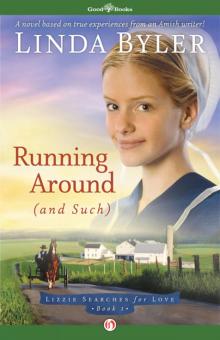 Running Around (and Such)
Running Around (and Such) Wild Horses
Wild Horses Lizzie Searches for Love Trilogy
Lizzie Searches for Love Trilogy Lizzie and Emma
Lizzie and Emma Little Amish Matchmaker
Little Amish Matchmaker The Witnesses
The Witnesses The Healing
The Healing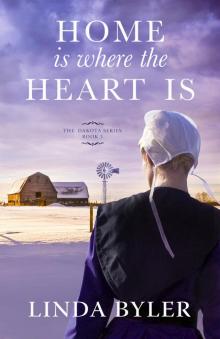 Home Is Where the Heart Is
Home Is Where the Heart Is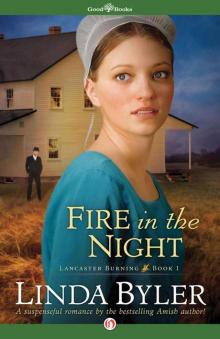 Fire in the Night
Fire in the Night When Strawberries Bloom
When Strawberries Bloom Little Amish Lizzie
Little Amish Lizzie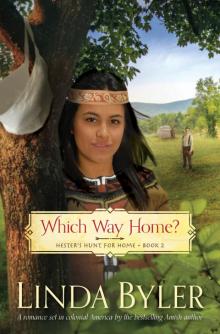 Which Way Home?
Which Way Home? The Homestead
The Homestead Sadie’s Montana Trilogy
Sadie’s Montana Trilogy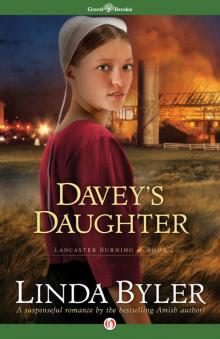 Davey's Daughter
Davey's Daughter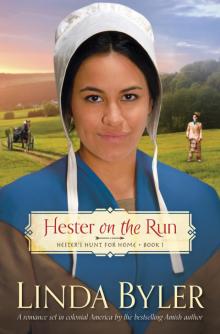 Hester on the Run
Hester on the Run Disappearances
Disappearances Big Decisions
Big Decisions Becky Meets Her Match
Becky Meets Her Match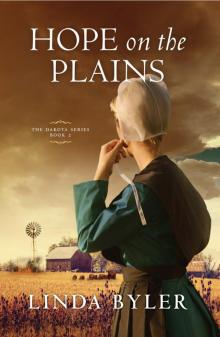 Hope on the Plains
Hope on the Plains Christmas Visitor
Christmas Visitor